Belém’s population is one-and-a-half million. Located 100km south of Brazil’s north coast on the east bank of the Amazon feeder river Pará, it’s the capital of the state sharing its name with the waterway. The city is only 160km south of the equator, an entry point into the rain forest and closer to Trinidad and Tobago than Brazil’s cultural magnet Rio de Janeiro.
Named after Bethlehem and founded in 1655, Belém’s economy is defined by its role as an incoming and outgoing port and has its roots in an early 17th century Portuguese fort. Its location and the attendant potential for the intermingling of disparate peoples renders its culture diverse.
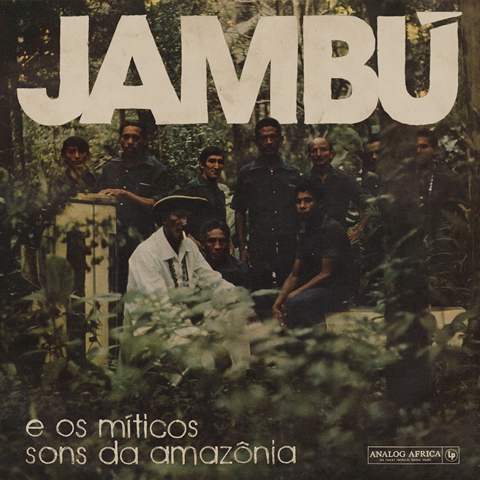 Jambú e os Míticos Sons da Amazônia is a new compilation bearing this out by collecting 18 tracks (a 19th, opening the compilation, is a short vocal chant). While the singing is in Portuguese and the music identifiably Brazilian, overall there’s a similarity with West African archetypes were they filtered through the music of the Caribbean islands to the north. Heard without context, Messias Holanda’s “O Galo Canta, O Macaco Assovia” would pass as West African, as would Verequete e o Conjunto Uirapuru’s (pictured below left amongst fans) “Mambo Assanhado”. This trait may be a result of the track selection process but without visiting let’s accept Jambú as a representative portrait of Belém’s music. There was a hungry market for locally produced records. The bandleader Pinduca’s 1973 album Carimbó e Sirimbó do Pinducat sold 15,000 copies.
Jambú e os Míticos Sons da Amazônia is a new compilation bearing this out by collecting 18 tracks (a 19th, opening the compilation, is a short vocal chant). While the singing is in Portuguese and the music identifiably Brazilian, overall there’s a similarity with West African archetypes were they filtered through the music of the Caribbean islands to the north. Heard without context, Messias Holanda’s “O Galo Canta, O Macaco Assovia” would pass as West African, as would Verequete e o Conjunto Uirapuru’s (pictured below left amongst fans) “Mambo Assanhado”. This trait may be a result of the track selection process but without visiting let’s accept Jambú as a representative portrait of Belém’s music. There was a hungry market for locally produced records. The bandleader Pinduca’s 1973 album Carimbó e Sirimbó do Pinducat sold 15,000 copies.
Jambú’s liner notes point to influences retained by slaves brought from the former Kingdom of Dahomey as well as what was broadcast by radio stations in Colombia, Cuba, the Dominican Republic Guyana and Suriname. Merengue, originating in Dominica, dominated in the 1960s and early Seventies. Pará evolved its own sound system culture: the Aparelhagen Sonora.
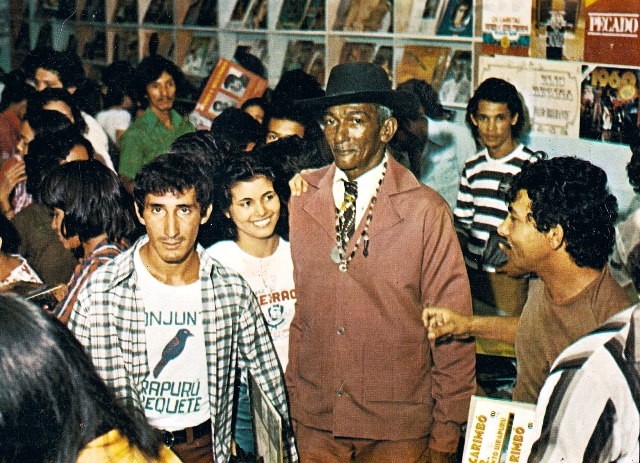 Despite the package’s informative, lengthy and readable liner notes there is no easy way to work out when the tracks were originally released: frustratingly, such a listing is absent. Dates are buried in the text. The cuts were issued in the Seventies, with the bulk from the middle of the decade.
Despite the package’s informative, lengthy and readable liner notes there is no easy way to work out when the tracks were originally released: frustratingly, such a listing is absent. Dates are buried in the text. The cuts were issued in the Seventies, with the bulk from the middle of the decade.
The word jambú in the title is borrowed from a plant used in Amazon and Paráense cooking which increases the appetite. It’s also an anaesthetic used for tooth and throat pain. Recently, a new use has come from combining it with sugarcane spirit as Cachaça de Jambú. As a multi-purpose plant, it’s analogous with this fusion music. The collection's full title translates as “Jambú and the mythical sounds of the Amazon.”
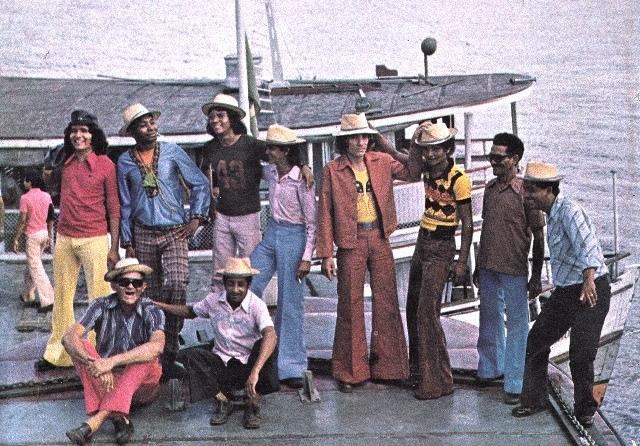 Proof of the music's tangibility comes with “A Misturada”, a 1976 album track by Os Muiraquitãns (pictured right), a big band from Abaetetuba, 40km south of Belém. They had a weekly nightclub gig in their hometown and recorded in Belém. Beginning with a guitar flourish and stabs of brass, “A Misturada” hits its relentless groove with funky guitar and rolling percussion. Irresistible.
Proof of the music's tangibility comes with “A Misturada”, a 1976 album track by Os Muiraquitãns (pictured right), a big band from Abaetetuba, 40km south of Belém. They had a weekly nightclub gig in their hometown and recorded in Belém. Beginning with a guitar flourish and stabs of brass, “A Misturada” hits its relentless groove with funky guitar and rolling percussion. Irresistible.
Janjao’s moody “Meu Barquinho” was recorded in 1977 and showcases a rich voice along the lines of Gilberto Gil, which is teamed with massed supporting female vocals and a musical stew suggesting muggy nights and packed early morning dance floors. In the liner notes, João Rodrigues da Silva Neto, who recorded as Janjao, says the track's source album Carimbó e Outras Mirongas “was a call to preserve our cultural heritage such as macumba. Also known as candombl, macumba is our Afro-Brazilian religion. The white people didn’t like these African gods and tried their best to convert slaves who – to appear like faithful disciples – fused orishas [Yoruba spirits] with Catholic saints as camouflage.”
While the context is enthralling and eye-opening, Jambú is a triumph because what’s heard is great. Cherry picking is pointless as it’s consistency and enjoyability which make Jambú e os Míticos Sons da Amazônia a top-notch compilation.
- Next week: Jon Savage’s 1965-1968 - The High Sixties On 45 and Los Angeles Modern & Kent Northern Soul – creative vinyl-only comps fostering new ways of listening
- Read more reissue reviews on theartsdesk
- Kieron Tyler’s website






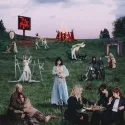

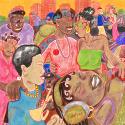




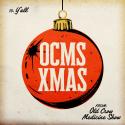

Add comment